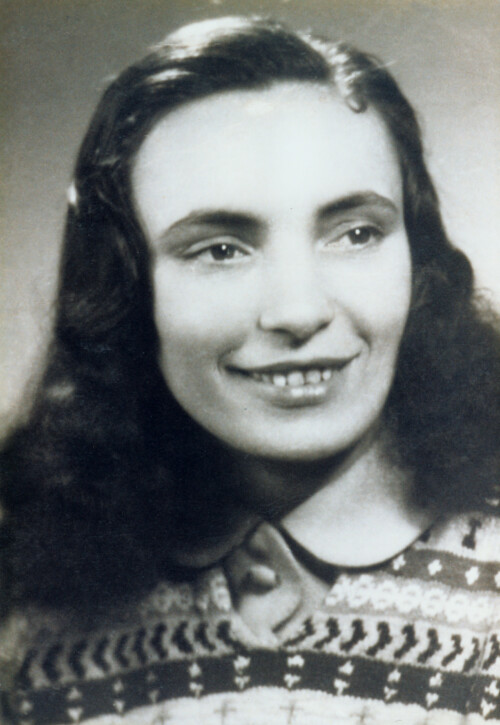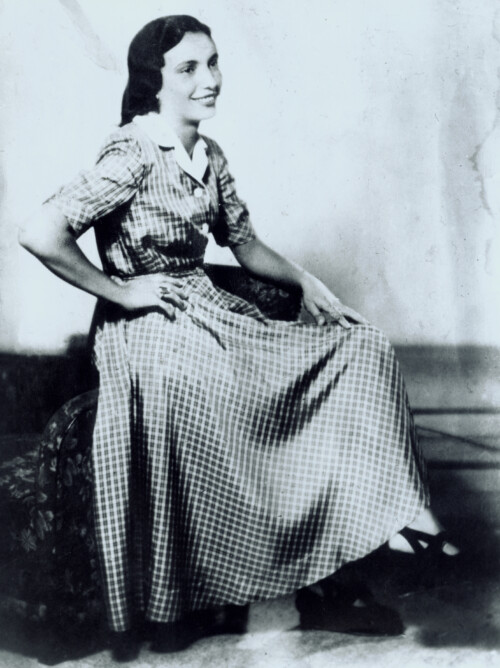

Berta Berousková
Berta Berousková, née Richtrová, born 1928 in Prostějov
-
Testimony abstract
Berta Berousková's family used to travel in a covered wagon. Her father Robert, who came from Olomouc, was a grinder and had a workshop in Prostějov; her mother Anna (born 1911) had Italian roots on her mother's side.
The gendarmes told Berta’s father[1] that they could not stay [in Prostějov] and had to go to Mezilesí, where they had domicile rights. A local gendarme then informed her father that they would go there to work, stay for about six months and then return. Her father believed the story, so they went there with a cart and horses, and with the wagon, but it turned out to be a camp called Lety.[2] Berta's grandfather Robert Čermák (born 1878) was already in the camp; she said he used to play cards and had been sent there as a forced labourer for gambling.[3] Upon arrival, they immediately had their horses and cart confiscated. Their hair was cut off and, with the exception of their father, they were sent to work in a quarry, where they broke and carried stones. The father was sent elsewhere; the men worked in the forest. Other members of the family there were Berta's grandmother Marie Richtrová (born 1884), her mother Anna, her sister Barbora (born 1926) and her father's brothers and their wives. The camp was guarded by Czech gendarmes from Písek and Tábor. The inmates received little food, which consisted of potatoes in their skins, red cabbage, soup, and quarter of a loaf of bread; they were hungry and sometimes went to the compost heap to steal peelings. On Saturdays after work they bathed in the pond below the camp, all together, women, men and children. In the wooden barracks, eight or ten people slept on bunk beds in one room. There was an earth toilet.
Berta came to Lety as a thirteen-year-old and spent thirteen months there. At that time [the head of the Nazi police in the Protectorate, Karl Hermann] Frank came to the camp and selected prisoners for transport to Auschwitz. Another man[4] came from Hodonín and told the assembled prisoners that one road led to Lety and the other to hell. Because Berta's parents' marriage was mixed, they considered her to be of mixed race, and so she was among the 90 or so prisoners who were released at that time.[5]
Berta’s sister Barbora and uncle Eduard (born 1912) previously managed to escape from the camp. However, her sister was caught and taken to Auschwitz and then to Ravensbrück.[6] Berta Berousková was then supposed to go to Dresden to work, but the train was attacked by partisans and she and three other girls managed to escape, although she was shot in her left hip as a result of which, she said, she was an invalid from 1944. During the escape, one of the girls fleeing disinfected her wound with urine, and she herself treated it with plantain. She hid with relatives in Prague until the end of the war.
- [1] It is not stated when.
- [2] Berta Berousková was registered at the so-called gypsy camp at Lety from 11 August 1942. (ed.)
- [3] Robert Čermák was interned in the Lety camp from 6 June 1942, when the holding camp was in operation there, the other family members after 2 August 1942, when a “gypsy camp” was opened on the site of the former holding camp. (ed.)
- [4] Name not given.
- [5] Information about the presence of Karl Hermann Frank is lacking in the otherwise fully preserved archival holdings. After the dispatch of the transport assembled by the much more resolute Hodonín commander, Lieutenant Štefan Bahynka, who replaced the dismissed commander at Lety, Capt. Janovský, 198 prisoners remained at the camp. They were then gradually taken either to the camp in Hodonín or to the holding camps at Prague-Ruzyně and Pardubice; only some of them were released on 27 May 1943.
- [6] Barbora Richtrová escaped on 9 December 1942 and Eduard Richter on 2 January 1943. Barbora's memoirs were published in the Italian magazine Lacio drom, 1965, No. 5, pp. 23-32. (ed.)
How to cite abstract
Abstract of testimony from: NEČAS, Ctibor, ed. Nemůžeme zapomenout = Našťi bisteras : nucená táborová koncentrace ve vyprávěních romských pamětníků. Olomouc: Univerzita Palackého, 1994. ISBN 80-7067-354-0, 77-78. Testimonies of the Roma and Sinti. Project of the Prague Forum for Romani Histories, https://www.romatestimonies.com/testimony/berta-berouskova (accessed 11/8/2025) -
Origin of Testimony
The tape recording and transcript of the recollection were made by Jana Horváthová on 10 February 1990.
-
Where to find this testimony




